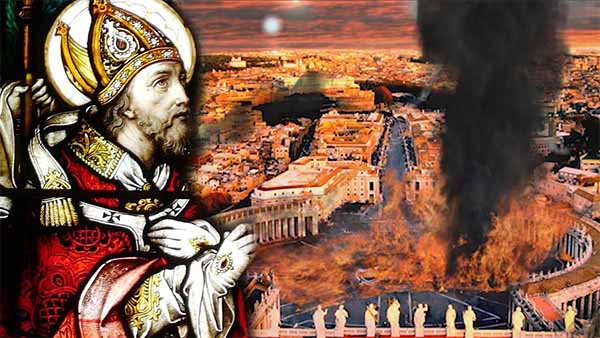Secrets of the Popes : Dark Vatican Archives Facts Revealed

In the heart of the Eternal City, ancient secret archives contain documents that recount surprising prophecies.
Enclosed in Rome, the Vatican - the smallest independent state on the planet (less than 1,000 inhabitants for less than 1 square km) - is the heart of Christianity. Everything in it evokes the sacred, but also the power, spiritual or not, which has emanated from it for centuries. For there are also the intrigues and secrets concealed in the immense Vatican libraries, jealously guarded by the highest religious dignitaries.
The prophecy of Saint Malachy
One of the most incredible pages relating to the Vatican is St Malachy prophecy on the end of the Catholic Church. It is written in its most disturbing passage: “During the last persecution of the holy Roman Church, Peter the Roman will be seated and he will feed his sheep through many tribulations; these over, once they have passed, the City of Seven Hills will be destroyed, and the Fearsome Judge will judge his people. Amen."
According to legend, Saint Malachy received the vision of all the popes who - from that day on - were to ascend the papal throne. This took place in 1148, but the manuscripts were not made public until 1595 thanks to the Prophetia de summis pontificibus, written by the Benedictine monk Arnold Wion. A line in Latin is devoted to the 112 popes on the list, predicting their election. The list begins with Celestine II and it appears to end with Benedict XVI.
The first pope on the list, Celestine II, is preceded by the sentence Ex castro Tiberis which can be translated as “From a castle on the Tiber”: the pontiff was, in fact, from Città di Castello (“The city of the Castle”), the main center of Umbria, in the upper valley of the Tiber.
For Lucius II, the prophecy announces: Inimicus expulsus, that is, "the expelled enemy" and the surname of the future pope was, precisely, Caccianemici (literally, "enemy hunter"). The famous Pope Celestine V is announced by the phrase Ex eremo celsus (“brought up in a hermitage”): Pietro da Morrone was, indeed, a hermit.
Continuing the list, the 107th Pope announced by Malachy is identified by Pastor and Nauta. Angelo Roncalli was a man from a humble background (pastor) and he was the Patriarch of Venice, the city on the water.
The number 108 is associated with the prophecy Flos Florum, "the flower of flowers", in his coat of arms. In 1978, Albino Luciani ascended the papal throne: his pontificate lasted only 33 days and Malachy had predicted about him De medietate lunae (From the mean time of a moon) which some have interpreted as "the time of a moon", exactly the duration of his pontificate.
The following twenty-seven years correspond to those of John Paul II, years announced in the prophecy by De Labore Solis (Labor of the Sun). Karol Wojtyla visited more countries than any other pope, making the Church shine in a land where the Sun never sets.
Finally, for the last pope announced by the words of Malachy, we read the sentence Gloria Olivae (Of the glory of the olive tree). When it comes to the pontificate of Benedict XVI, many relate to the olive tree as a symbol of peace. Benedict XVI is therefore the last pope to whom the prophecy would have dedicated a single line. Then will come the time of Peter the Roman and, with him, as we have already said, the end of the Catholic Church. The election of Pope Francis after his predecessor had renounced the papal office thus opened the way to new interpretations of St Malachy prophecy and of the fate of the institution of the Church.
Just as Peter was commissioned by Jesus to build the Church, so Peter II would restore the Church to Christ. The circle is complete ... provided you believe in the prophecies of a saint.









































































































































































































































































































































